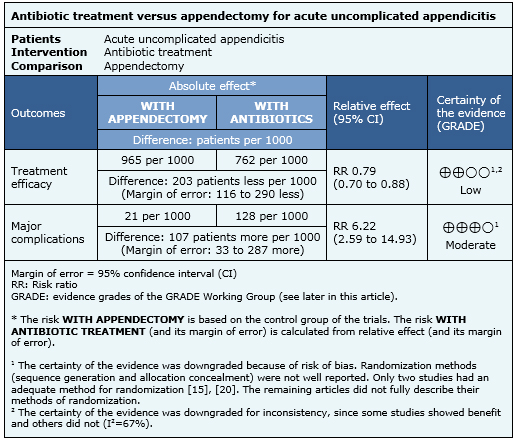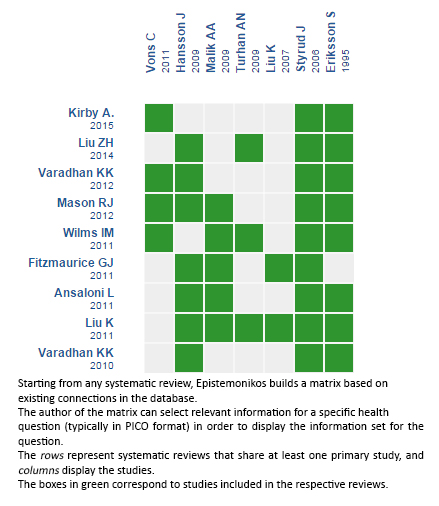Epistemonikos summaries
← vista completaPublished on January 27, 2016 | http://doi.org/10.5867/medwave.2016.6375
Are antibiotics a safe and effective treatment for acute uncomplicated appendicitis?
¿Es seguro y efectivo tratar la apendicitis aguda no complicada con antibióticos?
Abstract
Acute appendicitis is a common cause of acute abdominal pain and the most frequent cause of emergency abdominal surgery. In the last two decades, growing evidence has been published about the use of antibiotics as the exclusive treatment for acute appendicitis. Searching in Epistemonikos database, which is maintained by screening 30 databases, we identified nine systematic reviews including five pertinent randomized trials overall. We generated a summary of findings following the GRADE approach. We concluded the use of antibiotics to treat acute uncomplicated appendicitis may be less effective than appendectomy and probably increases major complications compared with appendectomy.
Problem
Acute appendicitis is a common cause of acute abdominal pain and the most frequent cause of emergency abdominal surgery, with an estimated lifetime incidence between 7 and 14% [1],[2]. Since the 1890s, when McBurney described early appendectomy as the therapy of choice for acute appendicitis [3],[4], surgery has remained the mainstay of treatment of this disease, drastically reducing its mortality rate [5].
Treatment of acute appendicitis with antibiotics as initial strategy was historically reserved for patients with several days of evolution of the inflammatory process who developed appendicular plastron or abscess, in an attempt to avoid major surgery [2]. In 1953, Harrison reported 42 of 47 cases of acute appendicitis treated successfully with antibiotics. Meanwhile, Coldrey published an article in 1959 with 471 cases of acute appendicitis treated conservatively, with only 1 death, 9 patients who required drainage of abscess and only 48 cases requiring a subsequent appendectomy [6].
In the past two decades, growing evidence has been published on the use of antibiotics as the sole treatment of acute appendicitis.
Methods
We used Epistemonikos database, which is maintained by screening more than 30 databases, to identify systematic reviews and their included primary studies. With this information, we generated a structured summary using a pre-established format, which includes key messages, a summary of the body of evidence (presented as an evidence matrix in Epistemonikos), meta-analysis of the total of studies, a summary of findings table following the GRADE approach and a table of other considerations for decision-making.
|
Key messages
|
About the body of evidence for this question
|
What is the evidence. |
We found nine systematic reviews [5],[6],[7],[8],[9],[10],[11],[12],[13] including seven primary studies [14],[15],[16],[17],[18],[19],[20], from which five correspond to randomized controlled trials [14],[15],[18],[19],[20]. This table and the summary in general are based on the latter. |
|
What types of patients were included |
All studies included adult patients with suspected acute appendicitis. |
|
What types of interventions were included |
Four of the studies used intravenous antibiotics for 48 hours [14],[15],[18],[19]. Of these, two studies used a combination of cefotaxime with tinidazole [14],[15], another study used ciprofloxacin plus metronidazole [18] and one used associated ampicillin with gentamicin and metronidazole [19]. The remaining study [20] used a combination of amoxicillin with clavulanic acid intravenously only if the patient had nausea or vomiting and for a time not specified. To complete oral treatment, two studies used a combination of ofloxacin with tinidazole [14],[15], another a combination of ciprofloxacin with tinidazole [18], one used amoxicillin with clavulanic acid [20] and one study did not specify the antibiotic used orally [19]. |
|
What types of outcomes |
|
|
We found three systematic reviews [5], [6], [7], including 14 studies reported in 21 references [8], [9], [10], [11], [12], [13], [14], [15], [16], [17], [18], [19], [20], [21], [22], [23], [24], [25], [26], [27], [28]. Eight studies correspond to randomized controlled trials (15 references [9], [10], [11], [12], [13], [14], [16], [17], [19], [21], [22], [23], [24], [26], [27]). This table and the summary in general are based on the latter. One study [15] did not contribute data to any of the outcomes of interest. |
Summary of findings
Information on the effects of antibiotic treatment versus appendectomy is based on five randomized trials [14],[15],[18],[19],[20] including 901 patients, of whom 415 were initially treated with antibiotic and 486 with appendectomy.
All studies reported the outcomes effectiveness of treatment and major complications.
- The use of antibiotics to treat acute uncomplicated appendicitis may be less effective than appendectomy. The certainty of the evidence is low.
- The use of antibiotics to treat acute uncomplicated appendicitis probably increases major complications compared with appendectomy. The certainty of the evidence is moderate.


Other considerations for decision-making
|
To whom this evidence does and does not apply |
|
| About the outcomes included in this summary |
|
| Balance between benefits and risks, and certainty of the evidence |
| What would patients and their doctors think about this intervention |
|
| Resource considerations |
|
|
Differences between this summary and other sources |
|
| Could this evidence change in the future? |
|
How we conducted this summary
Using automated and collaborative means, we compiled all the relevant evidence for the question of interest and we present it as a matrix of evidence.

Follow the link to access the interactive version: Antibiotics versus appendectomy for acute uncomplicated appendicitis
Notes
The upper portion of the matrix of evidence will display a warning of “new evidence” if new systematic reviews are published after the publication of this summary. Even though the project considers the periodical update of these summaries, users are invited to comment in Medwave or to contact the authors through email if they find new evidence and the summary should be updated earlier. After creating an account in Epistemonikos, users will be able to save the matrixes and to receive automated notifications any time new evidence potentially relevant for the question appears.
The details about the methods used to produce these summaries are described here http://dx.doi.org/10.5867/medwave.2014.06.5997.
Epistemonikos foundation is a non-for-profit organization aiming to bring information closer to health decision-makers with technology. Its main development is Epistemonikos database (www.epistemonikos.org).
These summaries follow a rigorous process of internal peer review.
Conflicts of interest
The authors do not have relevant interests to declare.

